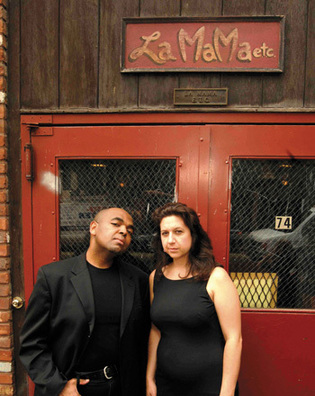 loading
loading
Arts & CultureOpera from the rubbleA writer's musical response to 9/11. Christopher Arnott is a freelance arts journalist in New Haven.  Azikiwe MohammedRoland Burks and Nicole Tori play the mother and father in Calling. View full imageThe tragedies of 9/11 were Wagnerian in scope. But Wickham Boyle ’81MBA saw her small piece of the turmoil as strong material for a different sort of opera -- about the down-to-earth qualities of humanity and perseverance rather than sensational vengeance from the skies. On that tragic day, Boyle -- whose family lived less than a dozen blocks from the World Trade Center -- heard the news, struggled to absorb it, then rushed to her son's elementary school, bringing him and a cluster of classmates home to some degree of safety. Much of the family's distress, including wondering whether they should leave their home (just outside the area from which the city required all residents to evacuate), came in the anxious weeks afterwards. Calling: An Opera of Forgiveness, which premieres in New York in September, takes one woman's viewpoint, anchored by the themes of family, home, and community, and gives it a multigenerational, multicultural, and multidisciplinary resonance. Boyle's 9/11 experiences have already led to a memoir, From Ground Zero: A Mother's Essays, published in 2001. To turn it into an opera, she collaborated with electro-acoustic composer Doug Geers. For Calling, Boyle adapted her essays so that the other members of her family have their own voices -- expressions that are magnified, she says, by having a rainbow of ethnicities in those leading roles. What Boyle began as a personal project she now likens to "Our Town for a small group of people living at Ground Zero." After the opening scene -- a flurry of troubled voices -- subsequent scenes tell the story after the World Trade Center has been hit by planes. The parents fret; then the mother character, based on Boyle, heads to the school. The towers fall. The family joins the community in cleaning up the rubble and helping survivors. The steady work triggers a sense that a return to a predictable, everyday existence is imaginable; scene six is titled "Playing at Normalcy." The opera ends in a universal post-traumatic expression of grief and despair, but with a harmony-filled coda:
Boyle says Calling is more accessible than the esoterica often associated with La MaMa E.T.C., the experimental performance space where it is being staged. (Boyle was La MaMa's executive director from the late 1980s through the ’90s; she's now a freelance writer for the New York Times and several national magazines.) The layered score brings its protagonists "from dissonance to harmony. I told Doug I didn't want the music to be difficult." But she also insists it "is definitely not September 11 -- The Musical!" Following a low-key preview performance and fund-raiser on September 11, Calling will run through September 28 at La MaMa. Boyle says she wants to keep the tale in context vis-a-vis the world-changing event that begat it: "There's an honesty to saying, This is my tiny story, of a mother running to get her kids." Being too close to the material or losing perspective, she says, isn't a problem, since "I have this wonderful son who says, at every point in the process, 'It's not the Wicki Boyle Show, Mom.'" Still, it's the intensely personal aspects of Calling that may call out most strongly to audiences still cautious about how our culture should treat the most devastating event in recent U.S. history.
The comment period has expired.
|
|